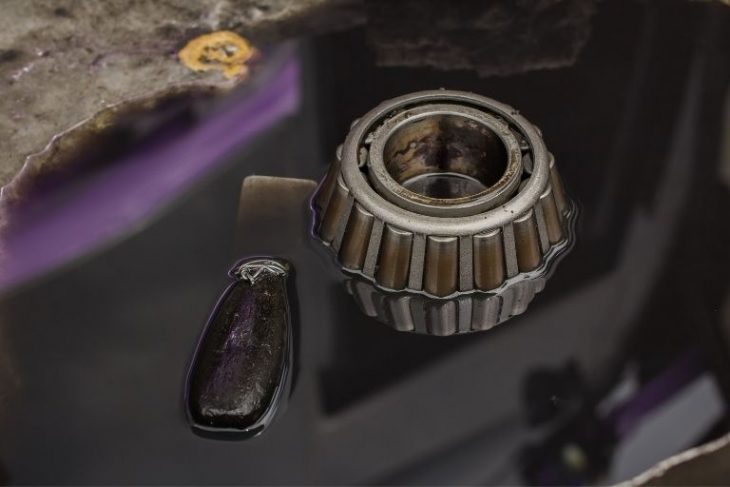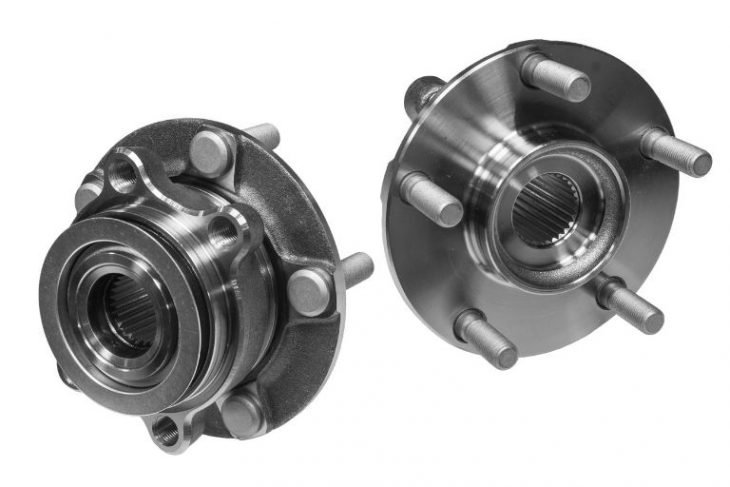Vehicles need a good set of tires to keep them performing optimally. But there is more to the wheel than the tire; beyond the visible rubber is an intricate network of pieces. One of those components is known as the wheel bearing, which has an essential responsibility: keeping the wheels working in sync. When wheel bearings start going bad, they make noise.
But how long will a wheel bearing last after it starts to make noise? Can you keep driving even after hearing those telltale noises?
It’s difficult to say exactly when a wheel bearing is going to fail but that doesn’t mean you have time to wait and see what will happen. Eventually, those noisy wheel bearings are going to give up entirely, endangering you and others on the road.
Let’s discuss some of the finer details of how long a wheel bearing will last.
Table of Contents
- Driving With a Bad Wheel Bearing or Two
- What Causes Wheel Bearings to Fail?
- What Kind of Noise Does a Bad Wheel Bearing Make?
- How Far Can You Drive Once a Wheel Bearing Starts Making Noise?
- Final Thoughts on Driving with Bad Wheel Bearings
Driving With a Bad Wheel Bearing or Two

You might be surprised to find out that wheel bearings have a lifespan of about 100,000 miles or more, depending on how well your vehicle is maintained. If your vehicle has less than 100,000 miles, you probably don’t have to worry much about the wheel bearings, unless they are defective.
But if your car is pushing beyond 100,000 miles and you start hearing a mysterious sound, it could indicate that something is wrong.
Noise in a motor vehicle is like pain in the human body. Both mean that you have a problem. Failing bearings should never be ignored. But what happens if you start hearing the noise suddenly while driving home from work?
First, you want to identify the sound. Is it clanging? Grinding? Humming? When you have a bad bearing, the volume of the noise is going to increase the further you go. Lubrication helps keep wheel bearings from making noise, but when your bearings go bad, there’s no more lubricant. As the vehicle accelerates, heat builds from friction.
To reduce the noise and other symptoms—like a wobbly tire, vibrating steering wheel, and pulling—slow down to about 40 mph. If you don’t slow down, there is a chance you will lose control of the vehicle.
What Causes Wheel Bearings to Fail?
Although wheel bearings will last over 100,000 miles, they rarely fail because of old age. No, it’s usually a mix of issues that compound.
1. Poor Driving Conditions
Whenever you drive, the wheel bearings are under pressure. On roads covered in potholes, that pressure gets infinitely worse. Such terrain damages the bearings, cracking and denting them. In the end, they will break down to the point of failure.
2. Accident
After having an accident, the first thing you want to do is get your car inspected. Even if there is no immediately visible damage, there could be a problem with your tires. For example, if the wheels were bumped, they could be misaligned or dented. That will affect the wheel bearings, causing them to make noises.
3. Water Damage
Wheel bearings hate water. The petroleum-based lubricant is not waterproof, so anytime you go through a deep puddle, there is nothing stopping water from infiltrating the system.
4. Unbalanced Tires
Regular maintenance will prolong the lifespan of every component in your vehicle. Balancing your tires is a key part of that. When wheels are unbalanced, it will put more pressure on the wheel bearings. This will cause the wheel bearings to wear down much more quickly and also impact your tires.
5. Improper Installation
If your wheel bearings start making noises shortly after a trip to the mechanic, you might have reason to believe that they were installed incorrectly. Sometimes, when the wrong wheel bearings are installed, they make noise. Go back to the auto body shop to have the issue corrected.
What Kind of Noise Does a Bad Wheel Bearing Make?
Cars, particularly older cars, get very vocal. As a driver, it is your responsibility to know what kind of noises rise up with certain issues. For example, do you know how to tell the difference between an engine knock and a failing catalytic converter?
There is a range of noises bad bearings can make, too. Here are the most common:
- Squealing – This sound is most often heard when a wheel bearing goes bad. It is often described as a squealing or growling noise that worsens as speed increases.
- Humming – This happens when the CV joint, tires, and wheel bearing are all affected.
- Howling – You might hear howling while decelerating, which points to a disconnected pinion-bearing. Should the pitch of the howl change as the speed goes up and down, it could mean you have frayed gears.
- Grinding – Commonly heard when wheel bearings are no longer lubricated, grinding is one sound you don’t want to ignore.
You might also hear clinking, popping, and snapping. If you experience steering wheel vibration, wobbly wheels, and pulling to one side along with noise, you need to get to the mechanic as soon as possible. These are all obvious signs that the wheel bearing is failing rapidly.
How Far Can You Drive Once a Wheel Bearing Starts Making Noise?

Once you start hearing the characteristic grinding and are experiencing other symptoms of faulty wheel bearings, the countdown is on. Unfortunately, there is no accurate measurement. A wheel bearing that is making noise could last 0 miles or 2,000 miles before it fails—but it’s going to fail. That is undeniable.
Generally, though, a wheel bearing will last for an additional 1,000-1,500 miles before it fails completely. As soon as you hear the sound of a malfunctioning wheel bearing, get to the mechanic.
Final Thoughts on Driving with Bad Wheel Bearings
The wheel bearing plays a pivotal role with the wheels of your car, which is arguably one of the most important features of a motor vehicle. Throughout the years, wheel bearings are sure to wear down. When they do, they start to create a loud humming, growling or squealing that gets louder the faster you go.
While the onset of that noise doesn’t mean immediate danger, it also doesn’t mean you should drive another 1,000 miles. Failing wheel bearings are a major hazard. So, if you hear that sound, take your car in for repairs as soon as you can.
Recommended Reading
7 Best Sound Deadening Materials for Cars
In this article, we have listed 10 best car or automotive sound deadening materials that are available in the market. We have also listed their unique features and why you should buy them.
Common Catalytic Converter Rattles and How to Quiet Them
After having driven your car for hundreds of thousands of miles, you might start noticing some odd symptoms. Maybe the check engine light comes on, you...
Why does my engine rattle on startup?
When you get into your vehicle and turn on the ignition, you want to hear your vehicle's engine purring like a kitten. Unfortunately, it may decide to sound...
How to Make Your Car Quieter Inside
If you want to be able to hear a pin drop while behind the wheel of your vehicle, here are some of the best ways you can go about making your car quieter inside.
How to Fix/Quiet a Noisy Lifter – 5 Best Ways to Fix or Quiet a Noisy Lifter
In this article, I have given 5 solutions on How to Fix or Quiet a Noisy Lifter Tick in the Car's Engine. These solutions are tested and working perfectly.
Why is My Car Making a Rattling Noise When at Idle?
Whenever you hear your car making a rattling noise when at idle it is always a gamble. A 50/50 chance of either being a simple fix or an expensive replacement.
